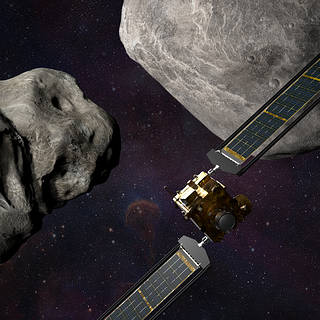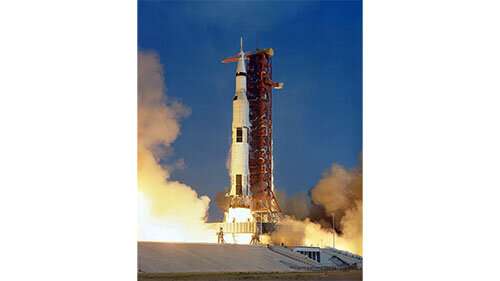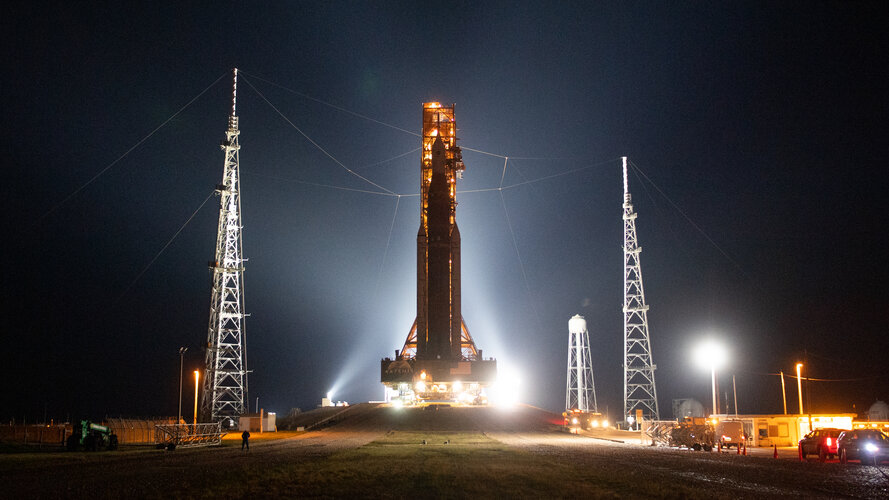
Copernical Team
NASA Invites Media to Witness World’s First Planetary Defense Test
 NASA’s Double Asteroid Redirection Test (DART), the world’s first mission to test technology for defending Earth against potential asteroid or comet hazards, will impact its target asteroid—which poses no threat to Earth—at 7:14 p.m. EDT on Monday, Sept. 26.
NASA’s Double Asteroid Redirection Test (DART), the world’s first mission to test technology for defending Earth against potential asteroid or comet hazards, will impact its target asteroid—which poses no threat to Earth—at 7:14 p.m. EDT on Monday, Sept. 26. La NASA invita a la prensa a la primera prueba de defensa planetaria
 La misión Prueba de redireccionamiento del asteroide doble (DART, por sus siglas en inglés) de la NASA, la primera en el mundo que pone a prueba una tecnología para defender a la Tierra de posibles peligros de asteroides o cometas, impactará con su objetivo, un asteroide que no supone ninguna amenaza para la Tierra, a las 7:14 pm EDT del lunes 26 d
La misión Prueba de redireccionamiento del asteroide doble (DART, por sus siglas en inglés) de la NASA, la primera en el mundo que pone a prueba una tecnología para defender a la Tierra de posibles peligros de asteroides o cometas, impactará con su objetivo, un asteroide que no supone ninguna amenaza para la Tierra, a las 7:14 pm EDT del lunes 26 d Saturn V was loud but didn't melt concrete

The Saturn V carried man to the moon and remains the most powerful rocket to successfully launch to orbit. It captures the imagination—but sometimes, it might capture a bit too much imagination. Abundant internet claims about the acoustic power of the rocket suggest that it melted concrete and lit grass on fire over a mile away.
Such ideas are undeniably false. In The Journal of the Acoustical Society of America, researchers from Brigham Young University used a physics-based model to estimate the acoustic levels of the Saturn V. They obtained a value of 203 decibels, which matched the very limited data from the 1960s.
To put that number into perspective, commercial jet engines range from around 120 to 160 decibels.
"Decibels are logarithmic, so every 10 decibels is an order of magnitude increase," said author Kent L.
Media briefing: Artemis I getting ready for launch
 Video:
00:57:00
Video:
00:57:00
The Artemis I mission is almost ready for launch: it will send an uncrewed spacecraft beyond the Moon and back.
Watch the replay of this virtual Q&A to learn more about Europe's contribution to the mission: ESA is overseeing the development of the European Service Module, that provides air, electricity and propulsion to the spacecraft. Participants to this media briefing include Josef Aschbacher, ESA Director General ; David Parker, ESA Director for Human and Robotic Exploration ; Jean-Marc Nasr, Airbus EVP Space Systems and Marc Steckling, Airbus Head of Space Exploration
Plate tectonics drives ocean oxygenation
 Until now, it has been assumed that the oxygenation of the oceans over geological timescales has mainly been driven by atmospheric oxygen levels. However, a new study published in Nature on June 27 2022 suggests otherwise.
Work by scientists at the Biogeosciences Laboratory (CNRS/UBFC), together with their colleagues at the University of California's Department of Earth and Planetary Scien
Until now, it has been assumed that the oxygenation of the oceans over geological timescales has mainly been driven by atmospheric oxygen levels. However, a new study published in Nature on June 27 2022 suggests otherwise.
Work by scientists at the Biogeosciences Laboratory (CNRS/UBFC), together with their colleagues at the University of California's Department of Earth and Planetary Scien US Navy military sealift command awards Inmarsat 10-year wideband follow-on contract
 Inmarsat Government has announced that the Defense Information Systems Agency (DISA) has awarded Inmarsat Government the U.S. Navy Military Sealift Command (MSC) Next Generation Wideband (NGW) Follow-On (FO) Contract for worldwide end-to-end commercial satellite communications services.
An Indefinite-Delivery, Indefinite Quantity (IDIQ) contract, the ceiling value of the award is $578M ove
Inmarsat Government has announced that the Defense Information Systems Agency (DISA) has awarded Inmarsat Government the U.S. Navy Military Sealift Command (MSC) Next Generation Wideband (NGW) Follow-On (FO) Contract for worldwide end-to-end commercial satellite communications services.
An Indefinite-Delivery, Indefinite Quantity (IDIQ) contract, the ceiling value of the award is $578M ove Wobbling droplets in space confirm late professor's theory
 At a time when astronomers around the world are reveling in new views of the distant cosmos, an experiment on the International Space Station has given Cornell researchers fresh insight into something a little closer to home: water.
Specifically, the space station's microgravity environment illuminated the ways that water droplets oscillate and spread across solid surfaces - knowledge that
At a time when astronomers around the world are reveling in new views of the distant cosmos, an experiment on the International Space Station has given Cornell researchers fresh insight into something a little closer to home: water.
Specifically, the space station's microgravity environment illuminated the ways that water droplets oscillate and spread across solid surfaces - knowledge that ESA technology leading to safer, smarter European roads

An agreement signed yesterday looks to extend the use of ESA space technology along European roads. The Agency’s Navigation Directorate has finalised a Memorandum of Intent with ERTICO, the organisation for the European Road Transport Telematics Implementation Coordination, a public-private partnership focused on the development, promotion and connection of intelligent road systems and services.
Black hole collisions could help us measure how fast the universe is expanding
 A black hole is usually where information goes to disappear-but scientists may have found a trick to use its last moments to tell us about the history of the universe.
In a new study, two University of Chicago astrophysicists laid out a method for how to use pairs of colliding black holes to measure how fast our universe is expanding-and thus understand how the universe evolved, what it is
A black hole is usually where information goes to disappear-but scientists may have found a trick to use its last moments to tell us about the history of the universe.
In a new study, two University of Chicago astrophysicists laid out a method for how to use pairs of colliding black holes to measure how fast our universe is expanding-and thus understand how the universe evolved, what it is 103rd successful rocket launch breaks record
 The Long March carrier rocket family, China's backbone launch vehicle fleet, has set a new record for successful consecutive launches after a Long March 2D launch over the weekend, according to the China Aerospace Science and Technology Corp, the country's leading space contractor.
The rocket blasted off at 1:37 am Saturday from the Xichang Satellite Launch Center in Sichuan province and l
The Long March carrier rocket family, China's backbone launch vehicle fleet, has set a new record for successful consecutive launches after a Long March 2D launch over the weekend, according to the China Aerospace Science and Technology Corp, the country's leading space contractor.
The rocket blasted off at 1:37 am Saturday from the Xichang Satellite Launch Center in Sichuan province and l 
